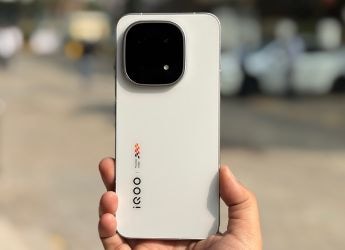Google Reportedly Stops Generating Fat APKs, Making Sideloading Android Apps More Tedious
Many of the apps will only be offered in a bundle format from Google, requiring users to download specific tools before the installation of APKs.

Photo Credit: Google
Google Play Store made development of apps with Android App Bundle mandatory in 2021
Google introduced the Android App Bundle (AAB) at the I/O 2018 event, enabling developers to build their applications as bundles as a more efficient way of delivering them to users. Courtesy of this change, Google Play Store only downloaded the specific portions it needed on smartphones and other devices during app installation, potentially saving storage space. However, this only applied to those apps downloaded via the Play Store, with sideloading apps still requiring the installation of fat Android Application Packages (APKs). A recent claim on social media suggests that the process of sideloading may have got a bit more tedious due to recent changes made by the company.
Sideloading Android Apps
In a post on X (formerly Twitter), Artem Russakovskii, the founder of APK hosting platform APKMirror, claimed that Google had stopped generating fat APKs for many apps. This means users who wish to install APK files will need to download bundles. While fat APKs can be installed by simply downloading a large APK file from the official websites or third-party sources, bundles often require an extra step.
FYI since people email @APKMirror about this several times a day... looks like Google stopped generating fat APKs for many apps entirely all of a sudden, and only bundles will be available from now on.
— Artem Russakovskii (@ArtemR) August 4, 2024
To my knowledge, there's nothing we can do about it.https://t.co/OrcKXDA7Kc
To install these types of packages, third-party tools will now be required, such as Split APKs Installer (SAI). As per the claims, many of the apps will only be available in a bundle format, requiring users to download these tools before being able to install the APK on their device.
Why It Matters
According to Google, fat APKs carried compatibility for several devices depending on their screen size, CPU architecture and more. This enabled developers to create a single package file instead of having to release multiple packages for various device types. While bundling everything in a single fat APK was said to make it easier for users to download, it led to unused content occupying a chunk of storage space on the device which could have been used for alternate purposes.
This problem is claimed to be tackled by Google's AAB. Instead of cramming requirements for all devices in a single fat APK, Google Play Store only downloads a portion of the file it needs to run the program on that particular device, leading to a reduction in the space occupied by the application.
Catch the latest from the Consumer Electronics Show on Gadgets 360, at our CES 2026 hub.
Related Stories
- Samsung Galaxy Unpacked 2025
- ChatGPT
- Redmi Note 14 Pro+
- iPhone 16
- Apple Vision Pro
- Oneplus 12
- OnePlus Nord CE 3 Lite 5G
- iPhone 13
- Xiaomi 14 Pro
- Oppo Find N3
- Tecno Spark Go (2023)
- Realme V30
- Best Phones Under 25000
- Samsung Galaxy S24 Series
- Cryptocurrency
- iQoo 12
- Samsung Galaxy S24 Ultra
- Giottus
- Samsung Galaxy Z Flip 5
- Apple 'Scary Fast'
- Housefull 5
- GoPro Hero 12 Black Review
- Invincible Season 2
- JioGlass
- HD Ready TV
- Laptop Under 50000
- Smartwatch Under 10000
- Latest Mobile Phones
- Compare Phones
- OnePlus Turbo 6V
- OnePlus Turbo 6
- Itel Zeno 20 Max
- OPPO Reno 15 Pro Mini 5G
- Poco M8 Pro 5G
- Motorola Signature
- Vivo Y50e 5G
- Vivo Y50s 5G
- Lenovo Yoga Slim 7x (2025)
- Lenovo Yoga Slim 7a
- Realme Pad 3
- OPPO Pad Air 5
- Xiaomi Watch 5
- Huawei Watch 10th Anniversary Edition
- Acerpure Nitro Z Series 100-inch QLED TV
- Samsung 43 Inch LED Ultra HD (4K) Smart TV (UA43UE81AFULXL)
- Asus ROG Ally
- Nintendo Switch Lite
- Haier 1.6 Ton 5 Star Inverter Split AC (HSU19G-MZAID5BN-INV)
- Haier 1.6 Ton 5 Star Inverter Split AC (HSU19G-MZAIM5BN-INV)















